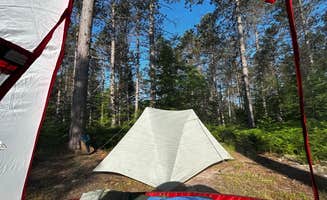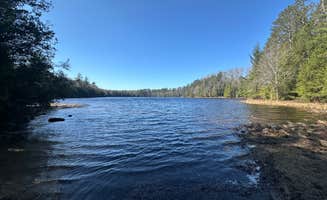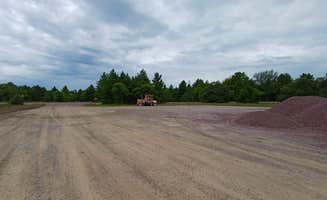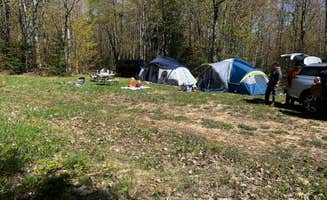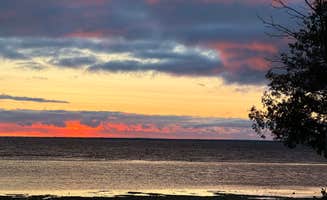Dispersed camping sites surround Chatham, Michigan within Hiawatha National Forest where elevations range between 600-800 feet. Forest road conditions vary seasonally, with spring thaw typically creating challenging mud conditions that persist into early summer. Most sites require self-contained camping equipment and preparation for limited facilities.
What to do
Fishing opportunities: Ironjaw Lake Dispersed Campsite provides access to multiple fishing spots. "We were lucky, we went pre-season. We did have to clear a bunch of down trees to get down the road but we had the site and the lakes to ourselves. It was gorgeous," notes camper Willow M.
Wildlife viewing: Coalwood Trail Dispersed Campsite offers wetland habitat viewing. However, be prepared for insects as Brad W. mentions, "Tons of mosquitos right next to a small danky pond."
Kayaking: Herman Lake Dispersed provides water recreation despite access challenges. According to Suzanne C., "We were able to kayak and it was beautiful and very private. Rain was expected the following day so we only chanced it for one night afraid a tree would block the road and the mud would get worse."
What campers like
Privacy: Hickey Marsh Dispersed Camping receives consistent praise for its seclusion. One camper, Tim, reports, "We only found 2 pull in sites and took the first one. We were able to back our 26 foot travel trailer in and stay hooked up to it. There was only 1 car drive by in 2 days."
Cell service: Unlike many remote areas, some dispersed sites maintain connectivity. "T-Mobile cell services was very good. I would warn though that the mosquitoes were pretty bad when we visited. Would still recommend for a quick stop over," writes Amy Y. about her experience at Hickey Marsh.
Lake access: Lake Superior Beachfront camping appeals to water enthusiasts. Nathan B. describes the proximity: "This place is tricky to find and I would suggest keeping a low profile. You'll have a front row seat to the lake. My hammock was almost over the water."
What you should know
Changing regulations: Several previously available free camping sites near Chatham have new restrictions. Bayou G. reports about Lake Superior Beachfront: "There are several signs saying 'No Camping' and 'Day Use Only.'" Similarly, Rachel S. warns, "There is signs posted just about everywhere 'no camping or overnight parking' don't waste your time."
Navigation challenges: GPS coordinates often lead to incorrect locations. Ben L. advises regarding Ironjaw Lake Dispersed Campsite: "Your best directions will come from locating the site on your GPS (in our case Google Maps) and dropping a pin. That took us straight to the location no problem."
Road conditions: Many access roads require high-clearance vehicles. Hunter W. describes the approach to Hickey Marsh: "Just off M-28, down the right side road a bit you will see campfire remnants and a spot where people tend to park on the left. No signage and only saw 2 pre used spots."
Tips for camping with families
Space considerations: Select sites with adequate room for multiple tents. At Hickey Marsh, Naomi L. notes, "Just want an overnight stay and are self contained it's perfect. We pulled in a 15 foot trailer and turned it around but wouldn't go much bigger."
Emergency planning: Given remote locations, develop backup plans for weather changes or road conditions. Suzanne C. explains from Herman Lake: "We stayed one night and made it to and from unscathed, we do not recommend towing down this road... Rain was expected the following day so we only chanced it for one night afraid a tree would block the road."
Bug protection: Insect repellent remains essential across all Chatham area dispersed sites, particularly in summer months. Several campgrounds near wetlands, including Coalwood Trail, report significant mosquito activity regardless of season.
Tips from RVers
Size limitations: Most free camping near Chatham, Michigan accommodates smaller trailers only. Tim mentions about Hickey Marsh, "We were able to back our 26 foot travel trailer in and stay hooked up to it," suggesting this represents a practical upper limit for many sites.
Road assessment: Walk forest roads before committing to drive RVs down them. Suzanne C. cautions from experience at Herman Lake, "We went down a very deeply rutted and muddy one lane road in for about 1.5-2 miles. We have a 21 ft travel trailer. Although we stayed one night and made it to and from unscathed, we do not recommend towing down this road."
Self-contained requirements: Most dispersed sites lack facilities, requiring fully self-contained camping setups. Waste disposal, water supply, and power generation must all be planned in advance when utilizing free camping options throughout the Hiawatha National Forest area.


